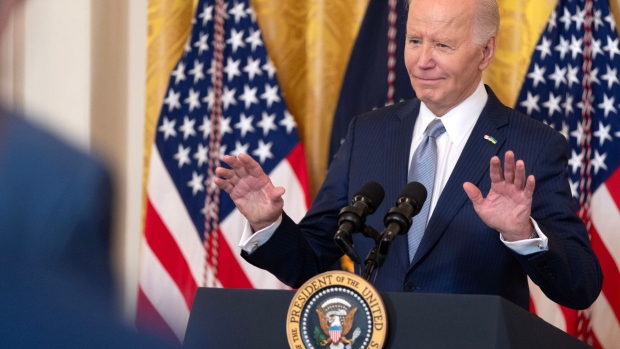Feb 27, 2024
Biden Warns Congress That Government Shutdown Would Damage US Economy
, Bloomberg News

(Bloomberg) -- Congressional leaders expressed confidence they could avoid a partial government shutdown after meeting at the White House with President Joe Biden, as time runs out to reach a deal.
House Speaker Mike Johnson and Senate Majority Leader Chuck Schumer said lawmakers are on track to approve spending bills to keep agencies open past the March 1 deadline. But the two leaders remain far apart on approving billions of dollars for Ukraine, Israel and the US-Mexico border, with Schumer describing the discussion as “one of the most intense I’ve ever encountered.”
Biden warned ahead of the meeting that “a shutdown would damage the economy significantly.”
“I think we all agree to that and we need bipartisan solutions,” he told reporters.
Hardline conservatives in the House have held up a government-funding agreement over demands that Johnson use the cutoff date to extract policy concessions from Democrats, including on abortion access, immigration and climate.
It’s the latest act of fiscal brinkmanship from right-wing Republicans, who have brought the government to the cusp of a shutdown three times since last summer. The political turmoil has sparked Fitch Ratings Inc. to downgrade US long-term credit ratings and Moody’s Investors Service Inc. to lower its outlook on the nation’s sovereign debt.
Congress has averted shutdowns thus far by passing stopgap spending bills, but Republican leaders have indicated they will not do so again as Johnson has assured his conference that he would fight for policy concessions in this set of negotiations. Some federal agencies, including the Departments of Veterans Affairs and Energy, would see their funding lapse at midnight Friday, and the rest will run out on March 8.
“We believe that we can get to an agreement on these issues and prevent a government shutdown,” Johnson told reporters at the White House following the meeting.
Despite the looming deadlines, congressional negotiators have yet to release the text of a spending agreement. Talks have continued while the House is on a 12-day recess that ends Wednesday.
The impact of a government shutdown on the US economy would depend on its length, building slowly and incrementally.
A full government shutdown would depress quarterly US economic growth by 0.2 percentage points each week it lasts, though much of the loss would be made up when federal workers were paid back wages, according to Bloomberg Economics estimates.
In the first week, only some parts of the government would shut down, accounting for about a fifth of agency funding, with the remainder closing the following week.
Financial markets so far have shrugged off the risk.
Ukraine Alarm
Schumer, who recently traveled to Ukraine, expressed alarm at the tenor of the discussion on that topic with Johnson. The Senate leader urged the speaker to drop his demands on border policy and allow a floor vote on an aid package.
“We said to the speaker, ‘get it done,’” Schumer said. “It’s in his hands.”
Johnson, however, showed no sign he would drop his demands for border policy changes in exchange for Ukraine aid, a message he relayed to Biden during a one-on-one meeting following the group discussion.
“The first priority of the country is our border and making sure it’s secure. I believe the president can take executive authority right now, today, to change that, and I told him that again today,” Johnson said.
The stalemate has further delayed consideration of fresh assistance to Ukraine, which is facing an ammunition shortage as its war with Russia enters its third year.
Ukrainian President Volodymyr Zelenskiy has warned his country will lose the war without more funds. Israel is also awaiting aid for its military campaign against Hamas, which has been designated a terrorist group by the US and European Union. Hamas killed around 1,200 people in its Oct. 7 attack on Israel.
In addition to Johnson and Schumer, House Democratic Leader Hakeem Jeffries, Senate Republican Leader Mitch McConnell and Vice President Kamala Harris joined the meeting with Biden.
CIA Director Bill Burns also joined, highlighting the administration’s sense of urgency about securing fresh funding for Ukraine and a temporary cease-fire in Gaza.
Border Politics
The four congressional leaders last convened in January to discuss the president’s emergency funding request for Ukraine, Israel and the border, which has been stuck in limbo since the fall.
The Senate passed its own, bipartisan version of the national security package, which included strict new policies meant to crack down on crossings at the southern border at the request of Republicans. But Johnson and GOP senators rejected the deal under pressure from former President Donald Trump, who wanted to deny Biden a victory ahead of a likely rematch in November.
Biden has sought to use the Republicans’ reversal to turn immigration from a political liability into a cudgel to deploy against Trump. Both men are scheduled to travel on Thursday to the border in Texas, underscoring how the issue has emerged as a top concern for voters. Biden plans to visit Brownsville, Texas, while Trump will visit Eagle Pass, Texas, the epicenter for a recent spike in crossings, more than 300 miles away.
Trump has blamed Biden’s policies for a historic number of crossings during his administration. Six in 10 swing-state voters say Biden bears responsibility for the situation, according to a Bloomberg News/Morning Consult poll released last month, showing how the president faces an uphill battle to neutralize the issue ahead of the November election.
--With assistance from Zach C. Cohen.
(Updates to add details on Biden, Trump travel in 24th paragraph. An earlier version corrected a Johnson quote in 17th paragraph.)
©2024 Bloomberg L.P.








